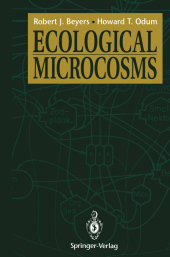 Neuerscheinungen 2012Stand: 2020-01-07 |
Schnellsuche
ISBN/Stichwort/Autor
|
Herderstraße 10
10625 Berlin
Tel.: 030 315 714 16
Fax 030 315 714 14
info@buchspektrum.de |

Robert J. Beyers, Howard T. Odum
(Beteiligte)
Ecological Microcosms
Softcover reprint of the original 1st ed. 1993. 2012. xv, 557 S. XV, 557 pp. 292 figs. 235 mm
Verlag/Jahr: SPRINGER, BERLIN 2012
ISBN: 1-461-39346-9 (1461393469)
Neue ISBN: 978-1-461-39346-7 (9781461393467)
Preis und Lieferzeit: Bitte klicken
Ecological Microcosms is a seminal work which reviews the expanding field of enclosed ecosystem research, and relates the results and models of microcosm studies to general concepts in ecology. Microcosms are miniaturized pieces of our biosphere, ranging from streams and lakes to terraria, agroecosystems, and waste systems. The study of these simplified ecosystems is providing provocative insights into ecological principles as well as issues of environmental management and global stability. The authors have used the well-known thermodynamic approach of H.T. Odum and numerous computer simulations. The book also includes an evaluation of alternative mesocosm approaches for the support of humans in space, as well as appendices to aid in the teaching of environmental concepts using student-created microcosms. Ecological Microcosms will be of interest to ecologists, environmental engineers, policy makers and environmental managers, space scientists, and educators. Robert J. Beyers is a Professor of Biology at the University of South Alabama. Howard T. Odum is Graduate Research Professor of Environmental Engineering Sciences at the University of Florida, and was awarded, with Eugene Odum, the 1987 Crafoord Prize in the Biosciences.
1 Microcosms: Concepts and Uses.- 1 Introduction to Microcosmology.- 2 Metabolism and Homeostasis.- 3 Succession and Self-organization.- 4 Chemical Cycles and Limiting Factors.- 5 Diversity and Information.- 6 Hierarchy, Control, and Oscillation.- 7 Stress, Toxicity, and Adaptation.- 8 History.- 2 Kinds of Microcosms and Mesocosms.- 9 Aquaria.- 10 Stream Microcosms.- 11 Terraria and Soil Microcosms.- 12 Wetland Microcosms.- 13 Ponds and Pools.- 14 Reefs and Benthic Microcosms.- 15 Plankton Columns.- 16 Thermal and Brine Microcosms.- 3 Microcosms for Society.- 17 Food Microcosms and Mesocosms.- 18 Waste Microcosms and Mesocosms.- 19 Human Microcosms and Space.- 20 Microcosm Perspectives.- Appendices.- A. Directions for Classroom Microcosms.- B. Directions for Monitoring Microcosms.- C. Experiments on the Closed Ecological System in the Biosphere 2 Test Module.


